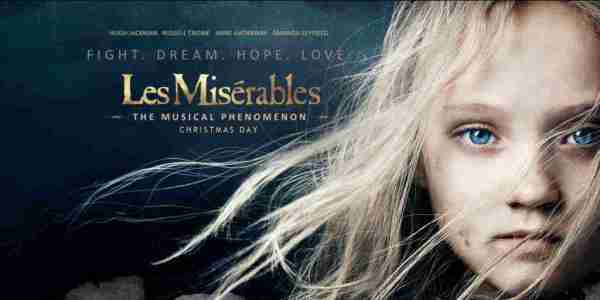
Les Misérables is an adaptation of the hugely successful stage musical based on Victor Hugo’s massive book of the years following the French Revolution. The film has already been feted with critical success and a lot of awards buzz, much of that based on director Tom Hooper’s decision to record the songs live and often in long close-ups.
The film begins in 1815, 26 years after the start of the French Revolution and a king back on the throne, where Jean Valjean (Hugh Jackman) has been in prison for 19 years for stealing a loaf of bread. He is overseen by the tyrannical Inspector Javert (Russell Crowe). Valjean is paroled and quickly falls back into a life of crime until a kindly bishop (Colm Wilkinson) inspires him to change his life. Valjean breaks his parole and embarks on a just life, doggedly pursued nonetheless by Javert.
The film begins with the massive spectacle of a not entirely convincing CGI ship being pulled to shore by a chain gang. The film’s starts epic but remains largely intimate for the rest of the film, it’s best moments nearly all shot in close-up. However, Hooper seems ambivalent about being too intimate and, not unlike Andrew Dominik’s direction in Killing Them Softly, frequently shows that he can do spectacle. As a result, the camera soars into the air to show a large Parisian cityscape, often when a close-up would have been more revealing. Similarly, the film can be horribly choppy – again, the film’s best moments often come in long drawn-out shots. Valjean jumps from prison to the mountains to a meeting with a parole officer to an attack by the police to the bishop’s stable in barely any time and his subsequent robbery, capture and salvation is rushed despite its narrative significance. The film often comes to resemble a shallow MTV music video more than the intimate and emotional musical that it clearly wants to be.
Victor Hugo’s novel seems like an adaptation nightmare and yet there have been numerous versions of the story, most played straight. Hooper’s film moves through 33 years of French history and makes an attempt to be faithful to the novel’s wide range of incidents and characters. As a result, the film can be very messy and certain shifts in perspective feel quite bumpy, such as when Valjean steps aside and the revolutionary youth Marius (Eddie Redmayne) and the heartbroken Eponine (Samantha Barks) take centre stage. Similarly, there is a problem with the film’s tone, which shifts awkwardly from Anne Hathaway’s damaged, undoubtedly Oscar-worthy rendition of “I Dreamed A Dream” and Hugh Jackman’s moving “Who Am I?” to the bawdy farce of “Master of the House.” Sasha Baron Cohen and Helena Bonham Carter, playing Monsieur and Madame Thenardier, are undeniably funny, but they go some way towards destroying the film’s seriousness and its emotional impact. While they take up way too much screen time, Amanda Seyfried’s Cosette is too often sidelined. Equally, the plot keeps her at unawares until the very end of the film, where Claire Danes’ Cosette in the admittedly more mundane 1998 version is given a lot more attention and intelligence. Similarly, the ending awkwardly turns around Valjean and Marius hiding Valjean’s past from Cosette, an unnecessary subterfuge that robs Cosette of any real role in the film. In the 1998 version, Claire Danes is told about her past fairly quickly and becomes a co-conspirator rather than a brainless symbol of innocence.
Hooper’s film favours Marius and the rather redundant Eponine and yet is no more attentive to these characters. Eponine is swiftly introduced and dispatched and her singing solo is not very interesting, while Marius is practically unknowable. Here we have an ardent revolutionary and a brave fighter and yet he is not above a glitzy bourgeoisie wedding only days after the violent destruction of his revolution. He returns to his father, a rich man who was previously openly contemptuous of everything that his son stood for. The film ends hopefully with the suggestion that the student’s sacrifice will breed further revolutions in the people and yet Marius, one of the revolution’s staunchest creators, will not take part. Coming out during the current political climate, the film cannot help but bring to mind the Occupy movement yet the film’s finale, a spirited and moving reprise of “Do You Hear The People Sing?”, is as rousing as it is insincere.
Les Misérables is a film that aims for greatness and every now and then that greatness does manage to seep through, yet the overall impression is of an unsubtle and cack handed emotional barrage in which many potentially moving scenes are either botched or overblown. Anne Hathaway and Hugh Jackman are both very good, intermittently able to portray an emotional honesty despite the often too obvious Oscar stage-managing. Indeed, Les Misérables is undeniably powerful, though it seems that oftentimes this is more down to Victor Hugo’s original work than the adaptations of Alain Boublil, Claude-Michel Schönberg or Tom Hooper. Ultimately, the film had a lot of potential but it was too often thwarted by a director who seems more interested in cinematic device than emotional undercurrent, becoming merely a great hits collection of heightened Oscar clips rather than a sustained emotional experience.
See also: The King's Speech (2011)
One note: the film doesn't cover 33 years of history but 17. The attempted revolution depicted in the film is not that of 1848 (which was successful) but that of 1832 (which was crushed). Some have suggested that the final scene is intended to represent 1848 but this is not stated, if so (and the people shown are all ghosts of those who died in 1832).
ReplyDeleteFair point. I do think the final scene does represent 1848, but it should read 17, not 33. Cheers.
Delete